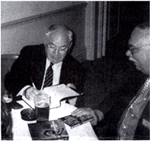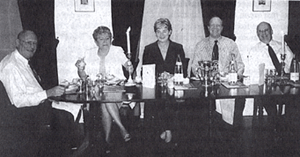DETC Oxford Meeting a Success

Author Colin Dexter (left) signs his latest book for
Dr. Richard Mandeville | Some 40 people from 6 countries attended the DETC Oxford Seminar at the historic Randolph Hotel in Oxford, England on September 10-11, 2000.
A tour of the ancient city of Oxford, dinner at Pembroke College-founded in the 12th Century and alma mater of Dr. Samuel Johnson-and a full day of seminar lectures and small work group sessions were featured.
An evening reception was hosted by Baron and Lady Prestoungrange at the Oxford offices of International Management Centres. The famous mystery novelist, Colin Dexter, creator of the Inspector Morse mysteries, spoke after dinner and autographed his latest book, "Remorseful Day." Copies of the book were presented to all attenders, compliments of Baron Prestoungrange.
|
All DETC members from the United Kingdom and Ireland were represented at the seminar. Said DETC Executive Director Michael P. Lambert, "As the DETC membership expands in Europe, there is a real need to provide opportunities for get togethers like this one. There was a genuine exchange of information and a wonderful social program. We are deeply indebted to Baron Prestoungrange and the IMC staff for all of their behind the scenes work at this meeting."
The Seminar sessions began with Michael P. Lambert informing attendees about new developments in the DETC, the U.S., and accreditation. Other participants talked about their schools and recent activities. The main theme throughout the discussions was the use of the Internet for learning. Mr. John Trasler (World Wide Learning), Ken Street (Telematica), Jack Goetz (Concord University) and Mathew Wills (IMC) presented their use of the Internet and described the do's and don'ts.
John described the market situation around the world. He said that there are more than 60 proprietary learning platforms. He predicted that in the future there would be several different learning platforms but only one management system. He said a design based on the XML-format is helpful and opens the door for other platforms.
Ken presented EASE, developed by Telematica. It is a modular software package using the latest client/server and Internet technologies to support many forms of learning. The most interesting part of the demonstration was the module "course-to-web." concept. It "converts existing paper based materials to fully functional online sources quickly, easily and cost effectively." Import is possible from Microsoft Word, PageMaker and other programs. The material can be converted into different styles and layouts following the needs of the client and/or his/her customers. Included also is an evaluation review for the client, his customer and/or accreditation bodies. More information can be found on their web site at www. telematica.co.uk.
Matthew described the global campus of IMC as they developed it. Content includes certificate, masters and doctoral courseware, integrated registry, student, faculty and alumni information, 1.300 full text management journals, content abstracts, dissertation abstracts. Plans for the future include online textbooks and audio. For communication they use: e-mail, listserv, chat, bulletin board, site navigation (bookmarks, full text search, etc.). Included is a security system and the possibility for different "branding" because they work together with different institutions and B2B. More information: www.i-m-c.org; user: mcross, password: Mike.
| Jack described Concord University School of Law, which is part of Kaplan (Washington Post). They use video lectures by the board of advisers, online communication (Professor led dialogues (audio), student generated e-mails, student discussion boards and telephone conferences), casebooks, journals, quizzes with detailed feedback (up to 500 multiple choice questions), essay questions with detailed feedback (up to 50), training of the staff, career services. They use only tools that are available free on the Internet (e.g. real player). | 
(From the left) Dr. and Mrs William Cottingham, Avril and Gordon Prestoungrange, and Michael P. Lambert at dinner at Pembroke College |
In the afternoon, three different groups discussed: Enrolling students via the Internet, Global strategic partnerships, DETC first professional degree programs and accreditation. Mr. Bernd Schachtsiek was the moderator of the group that discussed strategic partnerships. In a very open discussion participants described their experiences, failures and answered others' questions. The day ended with a reception at IMC and a reception and a dinner at Pembroke College.
Published Date: December 1st 2000
|





